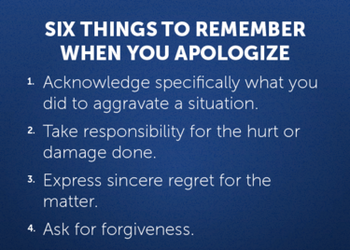Forward
The Power of Apology

In my work I sometimes have to mediate when there are disagreements between people. Most conflicts get resolved person to person, but as we’ve all experienced, sometimes it takes a third party to help work out differences.
Sometimes matters escalate when people stand by their “integrity” and feel that they are “right” about the way they handled themselves in a conflict, when in fact they said or did things that were hurtful. This increases unpleasant feelings and can lead to bitterness and worse.
While we try to informally mediate and listen to sometimes voluminous conflicting accounts of incidents or issues, we wonder what the best path out of the conflict is. And how will it be possible for two or more people who occupy the same church home live peaceably with one another? This includes relationships between those in the ministry and in the membership.
The shortest solution is often to apologize for your part in whatever the dispute is. It may be an oversimplification, but it’s one way to speed up a quick mending of fences. The longer an issue persists, the harder it is to get feelings straightened out.
But wait! Saying you’re sorry must be done properly to have its healing effect. Clumsy and patronizing apologies such as “I’m sorry you feel that way,” or “I’m sorry if I…” only drive the hurt deeper.
What really works is a sincere apology for whatever it is that we contribute to a dispute. It may even have a “heaping coals of fire effect” (Romans 12:20) on those who may be against us and could even be “enemies.”
When apologizing, do the following:
1. Acknowledge specifically what you did to aggravate a situation. Don’t be vague, which has the other party guessing.
2. Take responsibility for the hurt or damage done. Make sure the other party knows that you recognize your role in the event.
3. Express sincere regret for the matter. “We should have never let it get to this point. Our relationship is more important than the dispute.”
4. Ask for forgiveness. This is not easy for us to do, but it’s an absolutely necessary part of the healing and effectiveness of apologizing.
5. Promise that it won’t happen again. Show the other party that you are repentant and are making a change in your character.
6. Make restitution or take concrete steps to make amends if possible.
Apologizing is both easy and hard. The steps above are quite straightforward. But having the will and courage to make yourself vulnerable to someone who may not accept your apology is another matter. The prime blocker to apologizing in the above manner is pride. That’s where positive Christian behavior and doing the right thing stalls. And persistent pride leads only to an escalation. God has called us to live in peace. The apostle Paul opened many of his epistles, “Grace and peace be to you.” Peace comes when we work for it, and constructive efforts such as a simple “I’m sorry,” supported by a sincere desire to live at peace and to keep it that way, make great strides toward that peace.
Is there someone you can apologize to sincerely today? It could take one more of the burdens of life off your shoulders as we walk our Christian journey.

